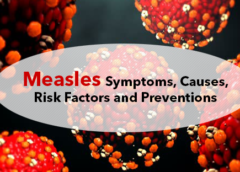Measles is an illness caused by a virus from a childhood. Once very popular, a vaccine nowadays will almost always prevent measles. Measles, also known as rubeola, can be debilitating and even fatal for small children. Although mortality rates have fallen worldwide as more children seek the measles vaccine, the disease still kills more than 100,000 people a year, most of them below 5 years of age.
Overall, measles hasn’t been prevalent in the United States for more than a decade because of high vaccination rates. In 2004, the United States had about 30 cases of measles but more than 600 in 2014. Most cases happened outside the country and occurred in people who were not vaccinated or who didn’t know whether they were vaccinated or not.
Symptoms
Signs and signs of measles begin from 10 to 14 days after being exposed to the virus. Typical measles signs and symptoms include:
- Fever
- Dry cough
- Runny nose
- Sore throat
- Inflamed eyes
The infection occurs in a sequence of stages during a period of two to three weeks.
Infection and incubation: The measles virus incubates for the first 10 to 14 days after you are sick. This time you don’t have any signs or symptoms of measles.
Nonspecific signs and symptoms: Measles usually begins with mild to moderate fever, which is often with a persistent cough, runny nose, inflamed eyes and sore throat. This relatively mild disease will last two to three days.
Communicable period: An individual with measles may spread the virus to another person for about eight days, starting four days before the rash appears, and ending four days after the rash has been present.
When to see a doctor
If you think you or your child may have been exposed to measles, or if you or your child has a measles-like rash, call your doctor.
Causes
Measles is a highly infectious disease caused by a virus that replicates on an infected child or adult’s nose and throat. Then, when someone has coughs, sneezes or talks with measles, infected droplets stream into the air, where other people can inhale it.
- Fever
- Dry cough
- Runny nose
- Sore throat
- Inflamed eyes
Risk factors for measles include:
Being Unvaccinated: If you haven’t been given the measles vaccine, you’re much more likely to contract the disease.
Foreign Travelling: If you are travelling to developing countries where measles is more common, the chance of catching the disease is higher.
Having a vitamin A deficiency: When your diet contains not enough vitamin A, you are more likely to serious symptoms and complications.
Complications
Complications of measles may include:
Ear infection: A bacterial ear infection is one of the most common complications of measles.
Bronchitis: laryngitis or croup. Measles can cause inflammation of your voice box (larynx) or an inflammation of the inner walls that line your lungs’ main air passageways (bronchial tubes).
Pneumonia. Pneumonia is common measles’ complication. People with weakened immune systems can develop mainly serious, variety of pneumonia which is sometimes dangerous.
Encphalitis: Usually, 1 in 1,000 measles sufferers experiences a disease called encephalitis. Encephalitis may occur immediately following measles, or may not occur until months later.
Pregnancy ProblemsL If you are pregnant, special precautions must be taken to prevent measles, since the disease can lead to premature labour, low birth weight and maternal death.
Prevention
The Centers for Disease Control and Prevention suggests taking the measles vaccine for children and adults to avoid measles.
Measles vaccine in children
Doctors generally give babies the first dose of the vaccine between 12 and 15 months to avoid measles in children, with the second dose normally given between the ages of 4 and 6. Keep in mind:
If you are going to fly overseas while your child is between 6 and 11 months old, speak to your child’s doctor about getting the measles vaccine sooner.
If your child or teen did not receive the two doses at the prescribed time, two doses of the vaccine could be needed four weeks apart.
Measles vaccine in adults
When you’re an adult you can need the measles vaccine to:
• Has an increased risk of measles — such as attending college, travelling internationally or working in a hospital environment — and you don’t have proof of immunity. Evidence of immunity requires written evidence of the vaccines or proof of immunity or previous illness from the laboratory.
• Was born in 1957 or later and you don’t have proof of immunity. Evidence of immunity requires written evidence of the vaccines or proof of immunity or previous illness from the laboratory.
If you’re not sure if you need the measles vaccine, talk to your doctor.
Preventing new infections
When you have measles once, the body has built up its immune system to combat the virus, so you cannot get measles again. Many people who were born or were staying in the United States before 1957 are prone to measles, mainly because they had it already.
There’s the measles vaccine for everyone else which is necessary for:
• Promoting and preserving widespread immunity. Measles has been nearly eliminated in the United States since the advent of the measles vaccine but not everyone has been vaccinated. This result is known as herd immunity. But herd immunity can now weaken a little, potentially due to a decrease in vaccination levels. The incidence of measles recently dramatically increased in the U.S.
• Preventing a resurgence of measles. Steady vaccination levels are critical because measles begins to come back soon after the vaccination rates decline. A now-discredited study was published in 1998 that wrongly linked autism to the vaccine against measles-mumps-rubella (MMR).

Leave a Reply
You must be logged in to post a comment.